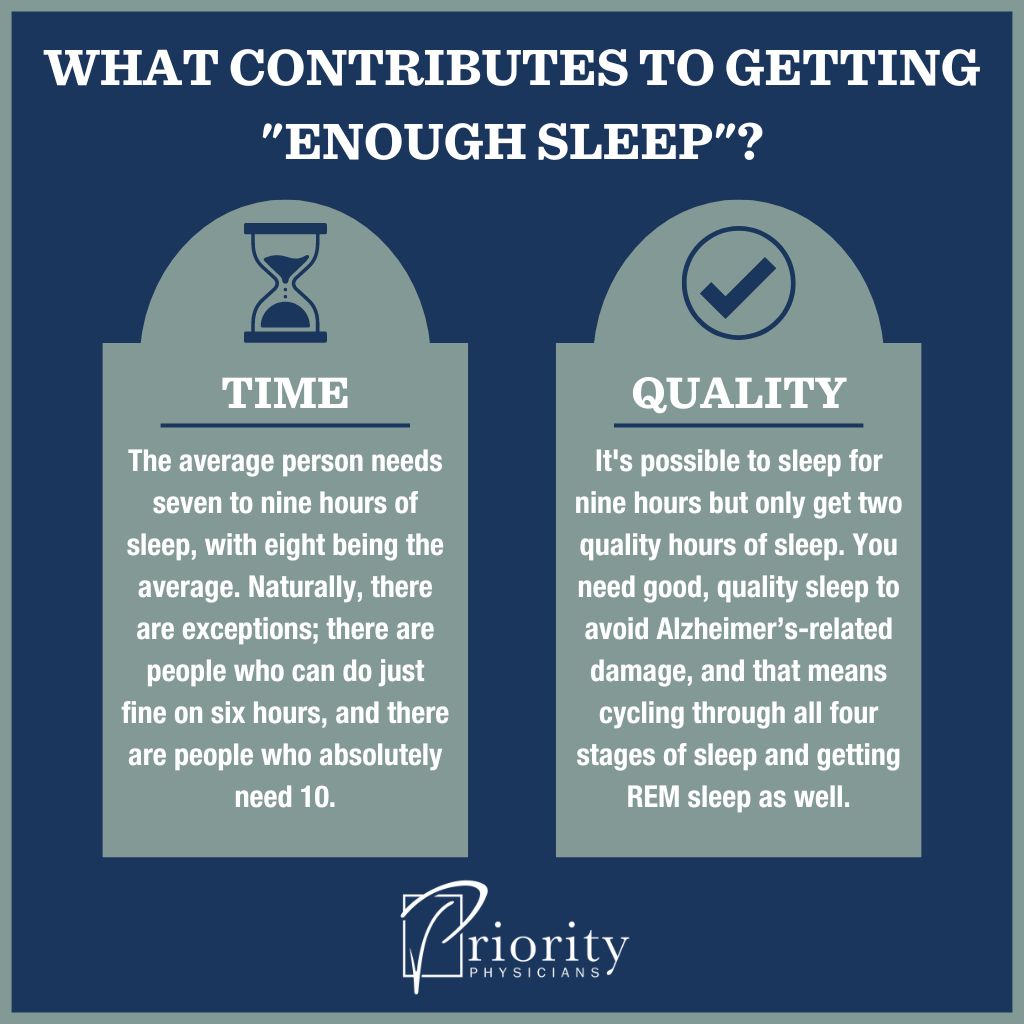“I’ve been having trouble remembering things.”
As a physician, I hear this often. After spending four hours with a patient, they’ll sheepishly mention their memory isn’t as good as it used to be, waiting for me to reassure them that they don’t have Alzheimer’s.
It’s clear to me that Alzheimer’s awareness matters now more than ever — so that we can differentiate it from the broader category of dementia and age-related memory loss, which happens to everyone in some degree. According to the Alzheimer’s Foundation of America, November is Alzheimer’s Awareness Month, making this is a fantastic time to start the conversation.
Let’s start by answering another question I hear often: Does lack of sleep cause Alzheimer’s?
What Causes Alzheimer’s?
The causes of Alzheimer’s and dementia are still a mystery, but we know there are risk factors for it. Age might be the biggest risk factor, and family history and head trauma seem to be linked as well.
But you can’t control your age or genetics. However, you can control certain lifestyle factors that may increase your risk of Alzheimer’s. Obesity and high blood pressure are controllable risk factors to some degree, but perhaps the most controllable of all is sleep.
Believe it or not, there’s a correlation between poor sleep patterns and Alzheimer’s. Getting better sleep now can reduce your risk of developing Alzheimer’s later in life.
Does Lack of Sleep Cause Alzheimer’s?
I can’t overstress how important sleep is for your body. It’s the time when your brain gets to “rest,” even though it’s technically still active. During sleep, your body works through healing processes, from building muscle to processing stress.
A leading theory in sleep study is that when you dream, your body works through the physical or emotional stressors in your life. You need to take time to rest and process stress, or your brain will continue to store it, which is horrible for your health. Simply put, if you don’t sleep well, you’ll wind up with a bad brain.
There’s also an interesting link between memory formation and sleep. College students who stay up all night studying and don’t get good sleep are actually less likely to remember what they studied. We learn during the day, but we solidify what we learn and commit it to memory at night when we sleep.
If you’re not sleeping well, it makes sense that you’d have memory problems. If you’re not sleeping, you’re awake, and when you aren’t getting good rest, you’re overworking your brain.
Right now, there are thousands of researchers actively working to understand the dementia-sleep relationship. We used to think dementia was caused by plaques and tangles in the brain, which makes sense — that’s like junk or garbage floating around in your head, and we saw that people who had dementia had more of those tangles.
But a medication developed to get rid of those tangles actually worsened dementia symptoms. Now, we think of those plaques and tangles as garbage cans — they might be overflowing, but they’re still needed to store the garbage.
Other than that, there haven’t been too many Alzheimer’s medications in the last 20 years. There are two approved drugs: Namenda and Aricept. Taking them for five years slows the progression of Alzheimer’s by about two months. That means after 60 months, you’ll have slowed the disease’s impact by only 60 days — not very time-efficient, in my opinion.
While we don’t know of a way to reverse memory damage, we do know getting good sleep can protect your brain and prevent damage in the first place.
What Counts as Lack of Sleep?
While there’s no hard-and-fast rule as to what counts as “enough sleep,” there are two factors you should consider:
Time
The average person needs seven to nine hours of sleep, with eight being the average. Naturally, there are exceptions; there are people who can do just fine on six hours, and there are people who absolutely need 10. There’s a wide variety out there. But time isn’t everything.
Quality
It’s possible to sleep for nine hours, but only get two quality hours of sleep. You need good, quality sleep to avoid Alzheimer’s-related damage, and that means cycling through all four stages of sleep and getting REM sleep as well. If you’re not cycling through those stages, I hate to break it to you, but you aren’t sleeping — you’re just laying in bed with your eyes closed.
Sleep apnea, insomnia, and alcohol all interfere with your body’s normal sleep stages and can greatly increase your risk of dementia.
Alcohol isn’t the only substance that can interfere with your sleep. Sleep aids like Ambien, Xanax, and Valium shortcut the normal sleep stages — they sedate you, but they don’t promote genuine, healthy sleep. Additionally, Ambien has even been shown to increase the risk of dementia in elderly patients.
The best thing you can to do to decrease your risk of Alzheimer’s is to make sleep a priority. Don’t wait until 11 p.m. to settle into a routine. If you’re really struggling, consider our tips for a good night’s rest.

What If I Have Memory Concerns?
So, does lack of sleep cause Alzheimer’s? The two are certainly linked — but once you improve your sleep hygiene, you likely don’t need to worry much about it.
I’m often surprised when patients I’ve known for years worry about memory loss, especially when it’s obvious there should be zero concern for it. If you’re worried about developing Alzheimer’s, talk to a trusted friend or spouse and be open about your fears — they’ll probably be able to provide the reassurance you need.
Although it’s relatively common, there are far more people who don’t develop Alzheimer’s than do. Most people aren’t going to get it.
If you want an outsider’s opinion, there are many tests out there for Alzheimer’s and dementia. These range from four-hour neuropsychological tests done by a physician to apps and virtual games that can stimulate your memory.
Memory games and tests are a great opportunity to improve your memory. Just like you exercise your muscles to get stronger, consistently exercising your mind can improve your memory. And, while it’s probably not a surprise, physical exercise lowers your risk of developing Alzheimer’s and dementia. It also helps many people sleep better — so keep your body moving!

